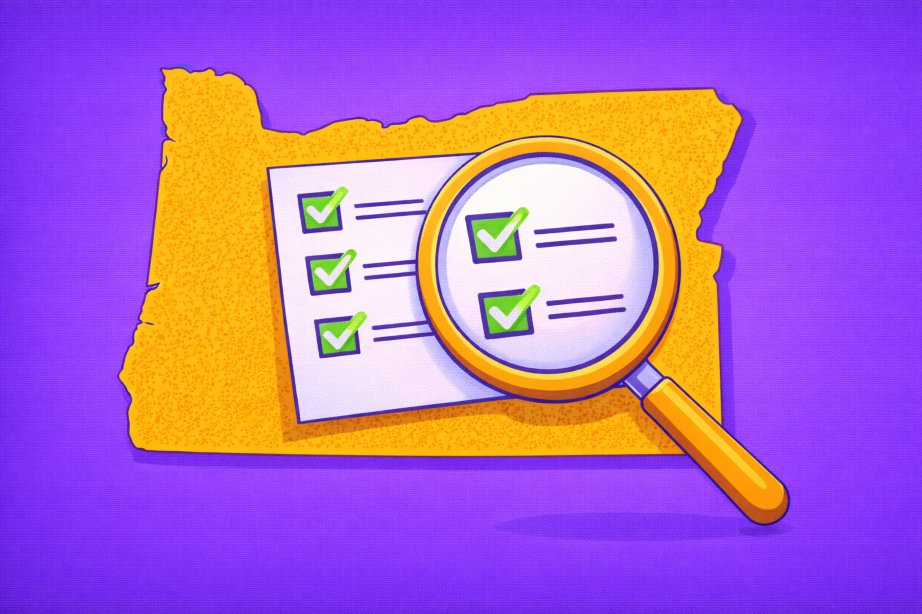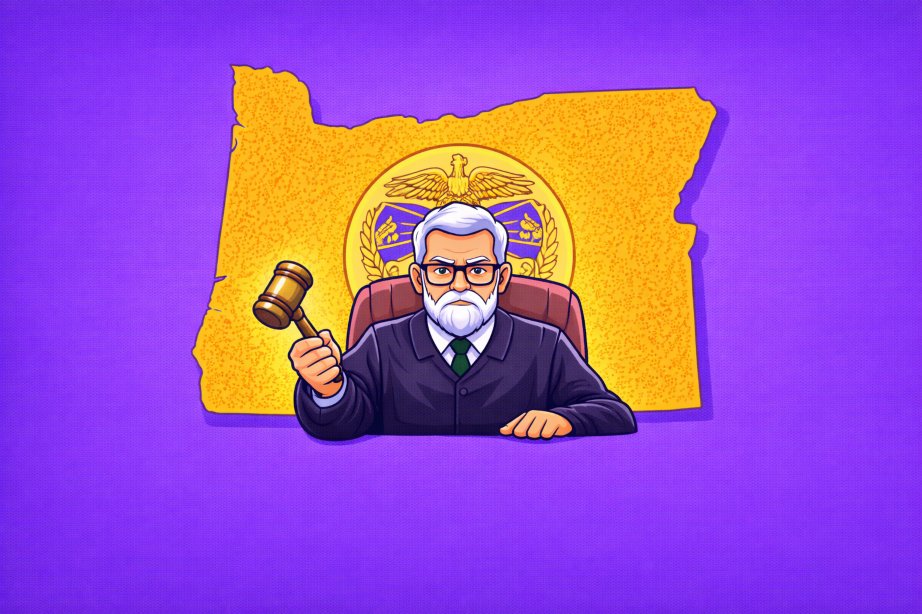We went through state gambling laws to figure out where Oregon sweepstakes casinos stand. And here’s what matters: the law doesn’t care what a site looks like.


By Jerard V.
Sweepcasinos Choice
25,000 GC + 2.5 SC
By Jerard V.
Welcome bonus
200,000 GC + 20 Spins
By Nemanja M.
Welcome bonus
550K GC + 55 SC
By Jerard V.
Welcome bonus
7,500 GC + 2.5 SC


Oregon law doesn’t ban sweepstakes casinos because they don’t meet the legal definition of gambling under ORS § 167.117 — as long as you don’t have to pay to play.
The moment a platform removes or hides its free-entry method, it stops being legal in Oregon. Your prize won’t be protected if payment is required to win.
Oregon does not license any online casino platforms. If a site looks like a casino and asks you to pay for prize-based games, it’s illegal under ORS § 167.147.
You’re on your own. The Oregon Lottery runs scratch games, Keno, and sports betting — but it has no oversight over sweepstakes platforms.
To stay legal, a platform must keep its prize coins and play coins fully separate. If it doesn’t, the entire system collapses into unlicensed gambling.
Platforms will ask for ID and location verification before payout. If you’re underage or using a VPN, your redemption will be blocked and your account could be closed.
Even if you win fairly, Oregon courts will not enforce a prize if the site violated gambling or consumer protection law. Screenshots and emails won’t change that.
Every redemption — cash, card, or gift — is considered taxable income. You might not get a tax form, but the IRS still expects it on your return.
There’s no pending legislation against sweepstakes casinos in Oregon. That’s because the current laws already cover them. If a site crosses the line, it can be blocked without warning.
If you can’t play for free, can’t see which coins are for prizes, or can’t find Oregon in the redemption dropdown — close the tab. Your m
🔍 Oregon doesn’t ban sweepstakes casinos
The state bans gambling under ORS § 167.117 — and that only applies when you:
If one of those is missing — like risk — it’s no longer gambling. It’s a sweepstakes or social casino gaming. And Oregon law doesn’t block those.
You can play sweepstakes casinos in Oregon if you’re in the right place, meet the platform’s age requirements, and pass identity verification when it counts. No license, no Oregon residency required — but if you miss any of the core legal checks, the site can shut down your win before it ever leaves the balance screen.
Sweepstakes casinos use geolocation tech. If you’re outside Oregon — or in a state where that platform isn’t legal — you won’t be able to redeem anything, even if you can still log in. That includes states like Washington, where sweepstakes play is outright banned.
Oregon allows it — because sweepstakes don’t meet the gambling definition in ORS § 167.117. But other states don’t follow the same rulebook. If the platform doesn’t allow Oregon in its terms, even being here won’t help.
Example:
If you win 500 SC on LuckyLand Slots while visiting California and try to redeem back in Oregon, it only counts if the site actually supports Oregon players at that moment. If Oregon’s been quietly geo-blocked (some platforms do this), the redemption will fail, and your balance won’t transfer.
Most sweepstakes casinos require users to be 18 or older, even though Oregon law doesn’t set a specific age for promotional contests. This standard matches Oregon Lottery rules (ORS § 461.600) and the platforms use it to stay clear of underage risk under ORS § 167.122.
It doesn’t matter if you’re just “testing the site” or haven’t redeemed anything yet. Once you try to cash out, you’ll hit ID verification — and if you’re under 18, your entire account can be locked and wiped.
What that means:
That means your email, your balance, your prize — all gone. Age claims don’t hold up unless they’re backed by ID.
You can sign up without showing much — but you’ll need to pass Know Your Customer (KYC) verification before any serious prize leaves the site. That includes uploading government ID and proof of address.
If your ID shows the wrong age or your IP says you’re not in Oregon, the site will block your payout. And because sweepstakes aren’t regulated in Oregon, you won’t be able to appeal the decision.
Real consequence:
If you earn 100 SC, try to redeem, and fail ID or location checks, you’re done. Even if you already gave payment details or sent in support tickets — there’s no fallback. No regulator steps in and your prize basically just vanishes.
Any one of these turns a sweepstakes into a real-money casino — and yes, Oregon bans those.
🔗 ORS § 167.147 — makes it illegal to run betting systems unless licensed. Oregon doesn’t license online casinos.
🧾 Example: The line in action
If the answer’s “yes” to all three — you’re still in Oregon’s safe zone. If not? You’re already outside it.


| 📜 Statute | 🔎 What It Says | 👀 What It Means for You |
| ORS § 167.117 | Defines illegal gambling as risking something of value on a game of chance for a prize | If a site removes the free-entry method (or makes it unusable), your play legally becomes gambling — and that makes your prize unenforceable. |
| ORS § 167.147 | Makes it illegal to operate or promote unlawful gambling unless licensed | If the platform doesn’t clearly separate play coins (for fun) and prize coins (for cash), it crosses into unlicensed gambling — even if it looks like a game. |
| ORS § 167.122 (second-degree gambling) | Treats any money involved in illegal gambling as contraband — and subject to seizure | Your prize money could be frozen or blocked if it came from a site operating outside Oregon’s definition of legal gameplay. |
| ORS § 167.122 (second-degree gambling) | Makes it a misdemeanor to knowingly participate in unlawful gambling | Playing on a non-compliant site (no free entry, no coin separation) could technically make you a participant in illegal gambling — even if enforcement is rare. |
| ORS § 646A.803 | Requires all sweepstakes to offer free entry and publish odds — or be considered deceptive | If a site hides its no-purchase method, it could be considered a consumer law violation — and your win would have no legal ground to stand on. |
| Oregon Constitution, Art. XV § 4(1) | Prohibits all casinos except those run by tribes | Any online casino that doesn’t follow the sweepstakes model can’t legally operate in Oregon — full stop. |
No.
Oregon doesn’t have a dedicated sweepstakes casino law. There’s no bill that spells out how prize-based gaming sites should operate — and no state body licensing them.
Instead, sweepstakes casinos operate legally by avoiding the gambling definition in ORS § 167.117. As long as there’s no required payment and coins are clearly separated, they don’t trigger any of the state’s gambling restrictions.
🧠 What this means:
You’re not risking jail time — but you are risking your wins, your time, and your own money if the site you’re using stops following Oregon law.
And if that happens, there’s no regulator to protect you. There’s no one you can call. And no court will help you get your prize back.
Let’s say the site quietly removes its free entry system. That one change means it’s no longer a sweepstakes under ORS § 167.117. You’re now gambling — and not legally.
🧠 What this means for you:
If you win a prize and try to cash out, the site can legally deny it. And if they shut down access to Oregon entirely? You won’t even get to try. And there’s no appeal system. No refund. Just a dead balance.
Sweepstakes sites don’t always verify your ID at signup. But once you try to redeem? You’ll need to prove your age, identity, and Oregon location.
🔗 Under ORS § 167.122, a minor or out-of-state player redeeming prizes could trigger liability for the operator — so sites take no chances.
🧠 What this means for you:
If you’re under 18, used a VPN, or can’t verify your Oregon address? Your account gets flagged. Your coins mean nothing. You might not even get a reply from support.
Even if the platform fails to pay you, your redemption attempt might still be reported to the IRS — especially if it involves PayPal sweepstakes deposits or a third-party processor.
🧠 What this means for you:
You could get hit with a tax document for a prize that never showed up. Oregon won’t help you dispute it, because the platform wasn’t licensed here in the first place.
Even if you have emails, screenshots, or a balance statement — Oregon courts won’t enforce a contract tied to illegal gambling.
🔗 ORS § 167.147 prohibits any unlawful gambling scheme, and Oregon has no licensing structure for online casinos.
🧠 What this means for you:
If the site isn’t compliant and refuses to pay you, you’re stuck. No lawyer, regulator, or court can help you collect.
If you’ve ever played a scratch ticket, scanned a Powerball slip, or used the DraftKings Sportsbook app in Oregon — you’ve already played through the Oregon Lottery.
It’s not just a game provider. It’s a state agency with a legal monopoly on gambling in Oregon. Created by voters in 1984 and backed by Article XV, Section 4 of the Oregon Constitution, the Lottery is the only entity in Oregon allowed to run most forms of legal betting.
🎯 What the Oregon Lottery actually runs:
That’s it. No blackjack, no roulette, no online slots — and definitely no sweepstakes casinos.
🔍 What the Lottery does not do:
🧠 Why that matters for you:
If something goes wrong on a sweepstakes site — a bug, a frozen payout, a blocked account — the Oregon Lottery won’t (and can’t) do anything. You’re outside their system.
💡 So why does the Lottery still matter?
Because its legal monopoly over gambling is why Oregon doesn’t allow real online casinos. There’s no license for them to get — because the Lottery runs the show.
Sweepstakes casinos only work because they avoid the gambling label entirely. They don’t offer licensed play — they offer promotional contests with free entry paths.
That’s how they exist legally in Oregon. And it’s also why you’re on your own if something goes sideways.
Some platforms still work here. Some already pulled out. The difference is never branding — it’s how the site is built. You don’t need to guess. Oregon law gives you a clear test.
Here’s how to check if your Oregon sweepstakes casino is playing by them famous rules — and if your prize will actually hold up.
This is non-negotiable. If the site doesn’t offer a no-purchase path (like a daily bonus or mail-in entry), then it’s not a sweepstakes in Oregon.
🔗 ORS § 167.117 defines gambling by “risking something of value.” Remove the risk — you remove the legal problem.
What to do:
– Check for a daily login reward
– Look for a visible mail-in option (not hidden in a PDF)
– Try requesting prize coins without paying
📌 If you can’t do any of that? You’re not playing legally — and your prize won’t be protected.
Every legit sweepstakes casino keeps two wallets: one for play (like Gold Coins), one for redeemable prizes (like Sweeps Coins). If it’s just one balance, Oregon sees that as a betting system.
🔗 ORS § 167.147 makes unlicensed gambling schemes illegal — and coin-mixing counts.
What to check:
– Are you told which coins can be redeemed?
– Are prize coins only awarded as bonuses or gifts (not sold directly)?
– Can you play without ever touching the redeemable ones?
📌 If the coins blur together, or redemption rules feel vague? That’s a red flag. You’ll have no footing if things go wrong.
Sites don’t always block you automatically. But if they no longer accept Oregon players, they’ll say so somewhere — even quietly.
What to check:
– Read the Terms of Service for a “restricted states” list
– Try starting a redemption — if Oregon is missing from the address field, stop
– Email support and ask directly — serious platforms will tell you
📌 If Oregon is excluded, and you try to redeem anyway? The site may void your account. And under Oregon law, you can’t enforce the payout.
No one likes KYC (Know Your Customer) checks. But if a site doesn’t ask for ID? That’s not convenience — that’s risk.
🔗 Under ORS § 167.122, operators have to avoid letting underage or out-of-state users gamble — or they face liability.
What to expect:
– A request for government-issued ID
– Proof of Oregon address (utility bill, bank statement)
– Rejection if you can’t verify both
📌 If the platform skips all that, it may not be built to last in Oregon — and it definitely won’t protect you if your prize goes missing.
You didn’t gamble. You followed the law. You used a sweepstakes site that gave you free entry.
But once you redeem a prize for real money? That’s taxable — and the IRS doesn’t care how legally clean your win was.
Here’s what you need to know before a sweepstakes prize becomes a surprise tax problem.
If you redeem Sweeps Coins or Tokens for cash or gift cards, that’s considered “miscellaneous income” under federal tax law. It’s not gambling income — but the IRS still expects it to be reported.
🧠 What this means for you:
Whether you earned the coins for free or bought a pack with bonus Sweeps Coins doesn’t matter. If you cashed out real value, it’s income — and it goes on your return.
Most sweepstakes casinos use third-party processors (like PayPal or Dwolla). If you receive $600+ in a calendar year through any one of them, you may get a Form 1099-K — but not always.
🧠 Why this matters:
If you don’t get a form, that doesn’t mean you’re off the hook. The IRS still expects you to report it. And if the processor sends a 1099-K and you don’t report it? That’s a mismatch — and a likely audit trigger.
📌 Best move: Track your own redemptions. Don’t count on the site to do it for you.
We are not talking about casinos here. Oregon doesn’t treat sweepstakes play as gambling. So you can’t claim losses like a poker player would.
🧠 What that means for you:
If you bought a $100 coin pack and redeemed $30 worth of prizes? You’re still expected to report the $30 — but you can’t deduct the $70 difference. That money is gone.
The IRS won’t do this for you. And Oregon doesn’t require sweepstakes platforms to issue any player-level tax docs.
Keep your own records:
🧠 Why this helps:
If the IRS asks questions later, you’ll have the timeline and documents ready. That turns a stressful letter into a solvable form.
Oregon isn’t drafting new laws for sweepstakes casinos. No ban is in the pipeline. No licensing system is coming. Lawmakers aren’t ignoring the space — they just don’t need to write more rules when ORS § 167.117 and § 167.147 already do the job.
If a site offers a free way to play and keeps prize coins separate, it slides under the law and stays legal. But the moment it looks like a real-money casino — payment required, prizes tied to purchase, coins blurred — Oregon treats it as illegal gambling.
What we recommend right now
You don’t need to panic. You just need to play smart. Here’s how to stay inside the legal lines — and protect your prize while you’re at it:
✅ Only use sites that clearly let you play for free
✅ Look for two wallets — one for fun, one for redemptions
✅ Avoid any platform that makes you buy prize coins directly
✅ Read the fine print: if Oregon isn’t supported, stop there
✅ Keep track of every cashout or gift card — the IRS might still want a piece
✅ Take screenshots once you redeem — no regulator means no backup
Compare Oregon with its closest neighbor sweepstakes states.
You won’t encounter any issues if you play at a sweepstakes site that complies with Oregon’s laws. This means providing a clear option to play for free, keeping prize coins separate from play coins, and never requiring you to spend money to win valuable prizes. If a site doesn’t meet these requirements, then it’s not a sweepstakes. Instead, it’s considered illegal gambling under ORS § 167.117. Doing so could result in the loss of your prize, as well as the suspension or closure of your account.
Although there is no sweepstakes-specific age law written into Oregon’s code, most platforms follow the state’s general standard of 18 and over. It’s because Oregon’s gambling laws, such as ORS § 167.122, target underage betting.
Yes, but only if the site hasn’t banned players from Oregon yet.
You do. The IRS considers sweepstakes prizes to be income on which you have to pay taxes, even if you didn’t pay to enter.
If a site refuses to pay out your winnings, you’re on your own. The state of Oregon doesn’t regulate these platforms, so there’s no state agency to help you.
The biggest risk isn’t getting into legal trouble; it’s losing your money, prize, or account. If the platform operates outside of Oregon’s legal limits, you won’t be protected. This means your prize could disappear, you could lose access mid-redemption, and you could still be subject to taxes. There’s no refund system. There’s no regulator. If a site makes a mistake, you’re the one who pays for it.